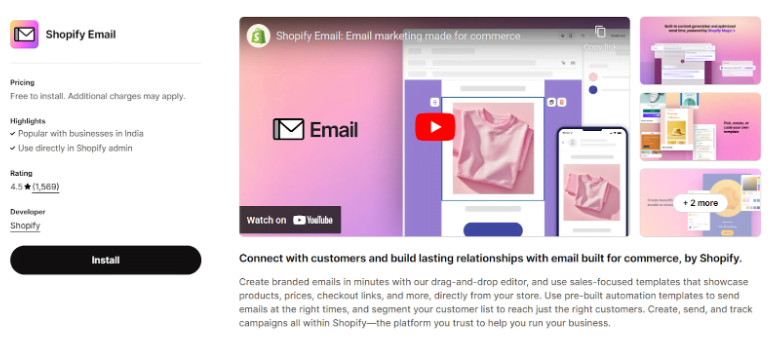A professional email address is crucial for building trust and improving communication with your customers. Shopify offers solutions to help store owners set up and manage their business emails efficiently.
With Shopify, you can create custom email addresses that match your store’s domain and use Shopify Email for marketing campaigns. But how do these features work?
In this guide, we’ll break down Shopify’s email options, from setting up a business email to using Shopify Email for promotions, so you can maximize these tools for your store.
Let’s get started!
Does Shopify Give You An Email?
Yes, Shopify provides professional email addresses, but there are a few conditions. Whether you’re on a paid Shopify plan (Basic or higher) or even using the free trial, you can create custom email addresses for your store if you’ve purchased a custom domain through Shopify.
For example, if your domain is “yourstorename.com,” you can set up addresses like “contact@yourstorename.com” or “support@yourstorename.com.”
However, keep in mind that Shopify doesn’t offer email hosting services. Emails sent to your custom address are forwarded to an external email account, like Gmail or Outlook, that you specify.
Even trial users can create a professional email address to explore the feature, but they cannot send or receive emails through it. This gives you the opportunity to try it out before upgrading to a paid plan.
Where To Find Shopify Email?
To access and set up your Shopify email addresses, you’ll need to navigate through your Shopify admin panel. Here’s how to find the email settings:
- Log in to your Shopify admin dashboard.
- Click on “Settings” in the lower-left corner.
- Select “Domains” from the left-side menu.
- Choose your primary domain name.
- Scroll down to the “Email forwarding” section.
This is where you’ll be able to add and manage your custom email addresses. Remember, to fully utilize this feature, you’ll need to purchase a custom domain through Shopify and be on a paid plan.
How To Create A Shopify Email For Your Store?
Creating a custom email address for your Shopify store is a straightforward process. Follow these steps:
Step 1: In the “Email forwarding” section of your domain settings, click on “Add forwarding email.”
Step 2: Enter the desired email prefix (e.g., “contact” or “support”) in the “Forwarding email address” field.
Step 3: In the “Receiving email address” field, enter the email address where you want to receive forwarded messages (e.g., your personal Gmail address).
Step 4: Click “Save” to create the email forwarding rule.
You can repeat this process to create multiple email addresses for different purposes or departments within your store. After setting up your email addresses, it’s crucial to test them by sending a test email to ensure the forwarding is working correctly.
What Is Shopify Email?
Apart from custom domain emails, Shopify also offers an email marketing solution called Shopify Email. This app allows you to create and send email campaigns directly from your Shopify dashboard without the need for third-party email marketing tools.

Shopify Email is designed to help store owners engage with their customers through professional-looking email campaigns. It offers features such as:
- Customizable email templates that match your store’s branding
- Integration with your product catalog for easy product showcasing
- Segmentation tools to target specific customer groups
- Performance analytics to track the success of your campaigns
- Automated email sequences for abandoned carts, welcome series, and more
This app is particularly useful for small to medium-sized businesses looking for a simple, integrated solution for their email marketing needs. It allows you to maintain consistent customer communication, promote new products, and drive sales without leaving your Shopify ecosystem.
Shopify Email Pricing
Shopify Email offers a budget-friendly pricing model, making it a great choice for businesses of all sizes. Here’s how the pricing works:
- No Charges for Abandoned Checkout Emails: Emails sent for abandoned checkouts remain free, making it easier to recover lost sales.
- No Carry-Over of Unused Emails: Any unused emails from your 10,000 free allowance don’t roll over to the next month.
- Free 10,000 Emails Per Month: Every Shopify store gets 10,000 free emails per calendar month, covering all email campaigns.
- Cost for Additional Emails: If you exceed 10,000 emails, Shopify charges $1 per 1,000 additional emails up to 300,000 emails.
- Lower Pricing for High Volumes: Once you go beyond 300,000 emails, the cost drops to $0.65 per 1,000 emails. If you send more than 750,000 emails, the rate decreases further to $0.55 per 1,000 emails.
- Billing Threshold: You won’t be charged for additional emails until your total cost reaches $0.005.
Related Reads:
Conclusion: Shopify Allows Trial Users To Create An Email!
Shopify’s email offerings provide an effective solution for e-commerce businesses looking to establish a professional online presence and engage effectively with their customers. The ability to create custom domain email addresses adds credibility to your brand, while the Shopify Email app offers a user-friendly platform for executing email marketing campaigns.
Remember, while Shopify provides these email solutions, it’s crucial to familiarize yourself with best practices in email marketing and adhere to relevant regulations such as CAN-SPAM and GDPR. This will ensure that your email communications are effective and compliant with legal standards.
FAQs
Yes, you can use Shopify Email even if your domain wasn’t purchased through Shopify. However, you may need to configure your domain settings to ensure proper email delivery.
Shopify Email is designed to integrate seamlessly with your Shopify store, making it easier to create product-focused campaigns. While it may not have all the advanced features of dedicated email marketing platforms, it offers a user-friendly interface and sufficient functionality for most e-commerce needs.
Shopify Email allows you to schedule your campaigns in advance. This feature helps you plan your marketing efforts and ensure timely delivery of your messages.
You can import your existing email list into Shopify Email. However, to comply with email marketing regulations, ensure that you have proper consent from your subscribers.
While Shopify Email is primarily designed for marketing campaigns, Shopify automatically sends transactional emails like order confirmations and shipping updates. These transactional emails can be customized in your Shopify settings but are separate from the Shopify Email app.

